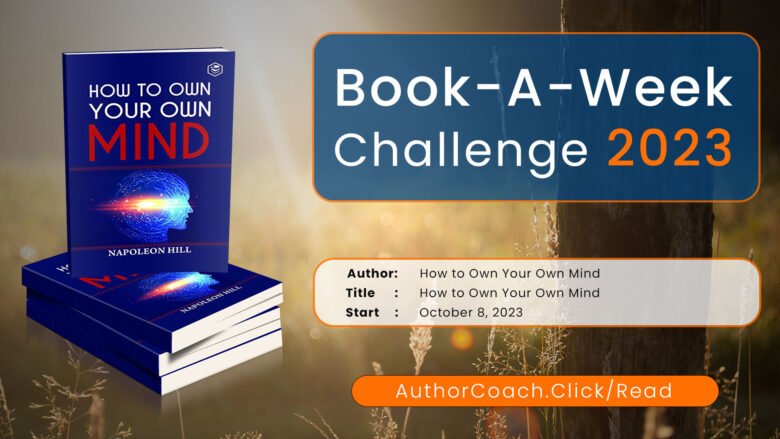In “How to Own Your Own Mind,” Napoleon Hill shares insights on harnessing the power of your thoughts to achieve success and personal growth. As a Christian non-fiction author, you can apply these principles to help your readers grow in their faith, emotionally impact their lives, and inspire them to make positive changes.
Here are the primary takeaways from Hill’s book, supported by biblical passages.
Takeaway #1: Cultivate a definite purpose in alignment with God’s will
Placeholder
- Proverbs 16:3: “Commit your works to the Lord, and your thoughts will be established.”
- Jeremiah 29:11: “For I know the thoughts that I think toward you, says the Lord, thoughts of peace and not of evil, to give you a future and a hope.”
- Romans 12:2: “And do not be conformed to this world, but be transformed by the renewing of your mind, that you may prove what is that good and acceptable and perfect will of God.”
Takeaway #2: Foster a positive mental attitude rooted in faith
Hill underscores the significance of maintaining a positive mental attitude in achieving success. As a Christian non-fiction author, you can guide your readers to nurture a positive mindset rooted in faith, trusting in God’s promises, and focusing on His goodness.
Biblical support:
- Philippians 4:8: “Finally, brethren, whatever things are true, whatever things are noble, whatever things are just, whatever things are pure, whatever things are lovely, whatever things are of good report, if there is any virtue and if there is anything praiseworthy—meditate on these things.”
- Isaiah 26:3: “You will keep him in perfect peace, whose mind is stayed on You, because he trusts in You.”
- 2 Corinthians 10:5: “Casting down arguments and every high thing that exalts itself against the knowledge of God, bringing every thought into captivity to the obedience of Christ.”
Takeaway #3: Develop self-discipline grounded in spiritual practices
One of Hill’s key principles is the importance of self-discipline in mastering one’s thoughts and actions. As a Christian non-fiction author, you can encourage your readers to develop self-discipline through spiritual practices such as prayer, meditation on Scripture, and regular fellowship with other believers.
Biblical support:
- 1 Corinthians 9:24-27: “Do you not know that those who run in a race all run, but one receives the prize? Run in such a way that you may obtain it. And everyone who competes for the prize is temperate in all things. Now they do it to obtain a perishable crown, but we for an imperishable crown. Therefore I run thus: not with uncertainty. Thus I fight: not as one who beats the air. But I discipline my body and bring it into subjection, lest, when I have preached to others, I myself should become disqualified.”
- Galatians 5:22-23: “But the fruit of the Spirit is love, joy, peace, longsuffering, kindness, goodness, faithfulness, gentleness, self-control. Against such there is no law.“
- Proverbs 25:28: “Whoever has no rule over his own spirit is like a city broken down, without walls.“
Takeaway #4: Embrace the power of mastermind alliances for spiritual growth
Hill discusses the concept of mastermind alliances, where individuals come together to share ideas and support each other in achieving their goals. As a Christian non-fiction author, you can inspire your readers to form their own spiritual mastermind alliances by actively participating in Bible studies, prayer groups, and church communities. These groups can provide accountability, encouragement, and spiritual insights to help them grow in their faith.
Biblical support:
- Ecclesiastes 4:9-10: “Two are better than one, because they have a good reward for their labor. For if they fall, one will lift up his companion. But woe to him who is alone when he falls, for he has no one to help him up.”
- Hebrews 10:24-25: “And let us consider one another in order to stir up love and good works, not forsaking the assembling of ourselves together, as is the manner of some, but exhorting one another, and so much the more as you see the Day approaching.“
- Proverbs 27:17: “As iron sharpens iron, so a man sharpens the countenance of his friend.”
Takeaway #5: Harness the power of persistence fueled by faith
Hill highlights the importance of persistence in overcoming obstacles and achieving success. As a Christian non-fiction author, you can teach your readers to cultivate persistence in their spiritual journeys by trusting in God’s strength and guidance, even during difficult times. Through persistence, they can overcome challenges and deepen their faith.
Biblical support:
- Galatians 6:9: “And let us not grow weary while doing good, for in due season we shall reap if we do not lose heart.”
- James 1:12: “Blessed is the man who endures temptation; for when he has been tried, he will receive the crown of life which the Lord has promised to those who love Him.“
- Philippians 4:13: “I can do all things through Christ who strengthens me.”
By incorporating these takeaways from “How to Own Your Own Mind” into your Christian non-fiction writing, you can help your readers understand the power of their thoughts and the importance of aligning them with their faith.
As they apply these principles, your readers will be better equipped to make meaningful changes in their lives, deepening their relationship with God and experiencing personal growth.




